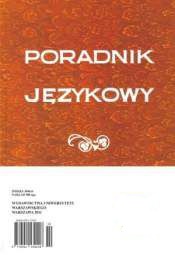PARADYGMAT FUNKCJONALNY A PARADYGMAT FORMALNY LEKSEMU - TRUDNE RELACJE
Lexeme Functional Paradigm versus Formal Paradigm - Difficult Relations
Author(s): Piotr WojdakSubject(s): Language and Literature Studies
Published by: Dom Wydawniczy ELIPSA
Keywords: paradigm
Summary/Abstract: In the view of the semiotic concept of inflectional paradigms developed by R. Laskowski (Morfologia 1998) - perceived as a synthesis of functional and formal paradigms - this article offers an independent look at noun paradigms (primarily functional ones) with regard to both the semantic number and the syntactic number (opinions on countable pluralia tantum such as no¿yczki are divergent) as well as an independent look at the formal paradigm with regard to the case and the number (which leads to an increase in the defectiveness threshold on account of the case and the exclusion of paradigms like museum). The implications between particular types of functional and formal paradigms are not bilaterally symmetrical: the formal paradigm is "determined" by the functional one rather than the other way around. The most incomplete functional paradigm (the so-called fragmentary paradigm, not discussed in Morfologia, e.g. dziêki, rêku) must correspond to the complete formal paradigm, whilst the most defective formal paradigm, i. e. the zero paradigm, does not converge only with the fragmentary paradigm. As a result of this functional and formal asymmetry of inflectional paradigms, the range of formal paradigms is limited to an undesirable circular sequence: the zero paradigm "borders" on the complete paradigm for the latter one can only comprise one textual form, too.
Journal: Poradnik Językowy
- Issue Year: 2007
- Issue No: 06
- Page Range: 39-50
- Page Count: 6
- Language: Polish
- Content File-PDF

